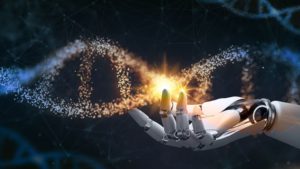Under the guise of biodiversity, they want to genetically manipulate all living beings
On March 25, a paper was published which describes that scientists have developed a new method to “create” artificial human chromosomes. The hope is that this will revolutionise gene therapy and other biotechnology applications.
We should be extremely concerned, but not surprised.
The aim since the Earth Summit in 1992 has been, under the guise of biological diversity, the genetic manipulation of any or all living creatures and the creation of synthetic DNA that does not currently exist in nature.

The following was originally published as the article Scientists Create Designer Chromosomes In Landmark Genetic Engineering Feat.
Scientists Create Designer Chromosomes
Scientists at the University of Pennsylvania’s Perelman School of Medicine have developed a new method to create human artificial chromosomes (HACs) that could revolutionise gene therapy and other biotechnology applications. The study, published in Science, describes an approach that efficiently forms single-copy HACs, bypassing a common hurdle that has hindered progress in this field for decades.
Artificial chromosomes are lab-made structures designed to mimic the function of natural chromosomes, the packaged bundles of DNA found in the cells of humans and other organisms. These synthetic constructs have the potential to serve as vehicles for delivering therapeutic genes or as tools for studying chromosome biology. However, previous attempts to create HACs have been plagued by a major issue: the DNA segments used to build them often link together in unpredictable ways, forming long, tangled chains with rearranged sequences.
The Penn Medicine team, led by Dr. Ben Black, sought to overcome this challenge by completely overhauling the approach to HAC design and delivery. “The HAC we built is very attractive for eventual deployment in biotechnology applications, for instance, where large-scale genetic engineering of cells is desired,” Dr. Black explains in a media release. “A bonus is that they exist alongside natural chromosomes without having to alter the natural chromosomes in the cell.”
To test their idea, the scientists turned to a tried-and-true workhorse of molecular biology: yeast. They used a technique called transformation-associated recombination (TAR) cloning to assemble a whopping 750 kilobase DNA construct in yeast cells. For context, that’s about 25 times larger than the constructs used in previous HAC studies. The construct contained DNA from both human and bacterial sources, as well as sequences to help seed the formation of the centromere.
The next challenge was to deliver this hefty payload into human cells. The team accomplished this by fusing the engineered yeast cells with a human cell line, a process that had been optimised in previous studies. Remarkably, this fusion approach proved to be much more efficient than the traditional method of directly transferring naked DNA into cells.
The results were stunning. Not only did the engineered HACs form successfully, but they did so with much higher efficiency compared to standard methods. Furthermore, these designer chromosomes were able to replicate and segregate properly during cell division, a key requirement for their long-term stability and functionality.
“Instead of trying to inhibit multimerisation, for example, we just bypassed the problem by increasing the size of the input DNA construct so that it naturally tended to remain in predictable single-copy form,” explained Dr. Black.
But the researchers didn’t stop there. They also devised a clever way to visualise the HACs in their native, uncompacted state. By gently lysing the cells and using a special centrifugation technique, they were able to isolate the HACs away from the rest of the cellular DNA. This allowed them to confirm that the HACs maintained their single-copy status and circular topology, without any unwanted rearrangements or additions.
The implications of this breakthrough are far-reaching. HACs have the potential to serve as safer, more effective platforms for gene therapy compared to current virus-based delivery systems, which can trigger immune reactions and involve the risk of harmful viral DNA insertion into the host genome. Artificial chromosomes also offer the advantage of being able to carry much larger genetic payloads, potentially allowing for the expression of entire gene networks or complex protein machines.
Beyond medical applications, the researchers believe their approach could also be valuable for agricultural biotechnology, such as engineering pest-resistant or high-yield crops.
While there is still work to be done to refine these artificial chromosomes and develop suitable delivery methods for therapeutic use, this study represents a significant leap forward in our ability to engineer designer genomes. By providing a more efficient and controlled way to construct HACs, the researchers have opened up exciting new avenues for advancing synthetic biology and expanding the toolkit for genetic manipulation.
As we continue to push the boundaries of what is possible with genetic engineering, the development of stable, single-copy human artificial chromosomes marks an important milestone. This breakthrough not only brings us closer to realising the full potential of gene therapy but also provides a powerful new platform for basic research into chromosome structure and function. In the future, designer chromosomes may become a standard part of the bioengineering arsenal, empowering scientists to tackle a wide range of medical and agricultural challenges.
Scientists Close To Controlling All Genetic Material On Earth
Sharing the article above, Patrick Wood, editor of Technocracy News & Trends, wrote:
“I have already detailed the plan to take over all genetic material on Earth that was hatched at the UNCED conference in Rio de Janeiro in 1992. ‘Designer Chromosomes’ means a synthetically engineered free-for-all using material from different species. This is a huge breakthrough for the ‘Evil Twins of Technocracy and Transhumanism’. Evil, indeed.
If you don’t listen to this, then you are hiding your head in the sand.”

In 2021, Wood published a “necessarily long and detailed” article describing the real driving force behind Agenda 21 and the 1992 United Nations Conference on Environment and Development (UNCED) held in Rio de Janeiro, Brazil. The conference is also referred to as the Earth Summit, ECO-92 and Rio-92. It was at this conference that Agenda 21, the Rio Declaration on Environment and Development, and the Statement of Principles for the Sustainable Management of Forests were adopted.
As Professor Dolores Cahill explained, Agenda 21 is the UN’s Agenda for the 21st century. It’s an agenda for the entire century and covers the period up to 2099. Emanating out of Agenda 21 are detailed plans for each decade: Agenda 2030, Agenda 2040, Agenda 2050 and so on. We are currently witnessing the rollout of Agenda 2030.
The UN’s Commission on Sustainable Development was created in December 1992 to ensure effective follow-up of UNCED and to monitor and report on the implementation of the agreements at the local, national, regional and international levels.
In his article, Wood confessed that to make it as brief as possible he purposefully left out other important areas that tie into this story, including the transhuman dream of creating Humanity 2.0 via genetic engineering, how it ties into the World Economic Forum’s Great Reset and what “living in harmony with nature” actually means. He said he would explore these topics in separate articles.
His article titled Global Blueprint Exposed: The Takeover Of All Genetic Material On Earth covers:
- The major concern at the 1992 Convention on Biodiversity was “protecting the pharmaceutical and emerging biotechnology industries.”
- The United Nations defined Biodiversity as “genetic resources”, which meant that genetic material was to be owned, exploited, and controlled through genetic engineering performed by the Biotech industry.
- The Post-2020 Global Biodiversity Framework calls for digital genetic sequencing of all species, including humans, to be stored as a global common asset and made available for licensing by the biotechnology industry.
- It intends to “bring about a transformation in society’s relationship with biodiversity and to ensure that, by 2050, the shared vision of living in harmony with nature is fulfilled.”
In concluding his article, he wrote: “Mapping of the human genome took most of the 1990s. Mapping the human brain, which started in 2010, is virtually complete. Now, mapping all DNA on Earth, including human DNA, is the next big technocrat/transhuman dream. The outcome will be genetic manipulation of any or all living creatures and the creation of synthetic DNA that does not currently exist in nature.”
You can read the full article here.
A year later Wood gave a lecture about “the genetic takeover of pretty much everything” at the American Freedom Alliance conference.
During his lecture, he spoke about transhumanism, the enhancement of the human condition using the convergence of nanotechnology, biotechnology, information and communications technology, and cognotechnology (NBIC). These scientific disciplines used to be in separate departments at universities. But starting in the late 1990s or early 2000s, these different departments began merging and collaborating.
“This has become a worldwide phenomenon and it started in academia before anybody paid any attention to it, no one knew, really, what was going on,” Wood said. Every university in America now has an NBIC department which is largely funded by taxpayers’ money.
“When they talk about convergence, they’re talking about taking all four of these together and applying this new science – this NBIC science – to the condition of man, to advance the condition of man,” he explained. He is referring in particular to our physical bodies.
The ones who are pushing transhumanism today, including the World Economic Forum, believe they have the technology to modify the elements of life and that they will take over the intelligent design of life from now on. “They honestly believe that and have said that. This is intentional,” Wood said.
If you are someone who believes in evolution, what the advocates for transhumanism are saying is that they are going to hijack the evolutionary process and take over from now on.
“It is not just for messenger RNA shots that are going into your arms. It’s about every living being on Earth, everything on Earth,” Wood warned.
In addition to Agenda 21 and other declarations, the Convention on Biological Diversity (CBD), also referred to as the Biodiversity Convention, was signed by 150 government leaders at the 1992 Rio Earth Summit and entered into force on 29 December 1993. This is the document, according to Wood, that provides proof of the agenda to genetically manipulate all life on Earth. The United States is the only UN member state which has not ratified the Convention. You can see a list of countries that ratified the Convention here.
The Convention has three main objectives: the conservation of biological diversity, the sustainable use of its components, and the fair and equitable sharing of benefits arising out of the use of genetic resources.
As we have learned, anything related to the UN is not beneficial to us or our Earth, despite how it is portrayed. After citing a book written by two attendees of the Rio Earth Summit, Wood said, “The United Nations picked up ‘biodiversity’ as the genetic takeover of the planet.”
Since 1992 seeds, mosquitoes, cattle, pigs, chickens, turkeys, salmon, trout, catfish, tilapia, striped bass, flounder, bacteria, viruses and humans have been genetically modified.
yogaesoteric
April 6, 2024
